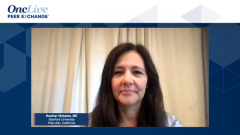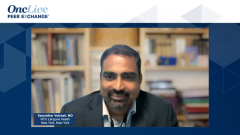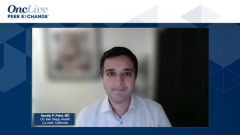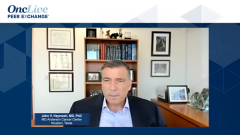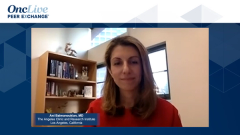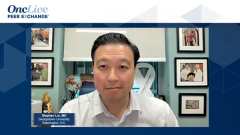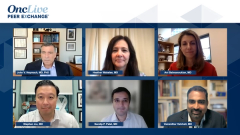
Treatment Landscape for EGFR-Mutant Advanced NSCLC
Ani Balmanoukian, MD, Sandip P. Patel, MD, and Heather Wakelee, MD, review currently available treatment options for EGFR-mutant advanced NSCLC and discuss their approach to frontline therapy.
Episodes in this series

John V. Heymach, MD, PhD: Hello and welcome to this OncLive® Peer Exchange entitled, “Key Updates in Lung Cancer in 2021.” I am John Heymach, chair of Thoracic/Head and Neck Medical Oncology at MD Anderson Cancer Center in Houston, Texas. I’m joined today by a panel of experts in the field of lung cancer. I would like to welcome my esteemed fellow panelists to introduce themselves. Heather.
Heather Wakelee, MD: Hi, I’m Heather Wakelee. I’m the chief of Medical Oncology at Stanford University. It’s great to be here with all of you.
John V. Heymach, MD, PhD: Dr. Balmanoukian.
Ani Balmanoukian, MD: Hi, I’m Ani Balmanoukian. I’m director of Thoracic Oncology at the Angeles Clinic and Research Institute, which is a part of Cedars-Sinai affiliate.
John V. Heymach, MD, PhD:Stephen.
Stephen Liu, MD: Hi. Stephen Liu, director of Thoracic Oncology at Georgetown University in Washington, D.C. Nice to see everyone.
John V. Heymach, MD, PhD: Sandip.
Sandip P. Patel, MD: Hi, Sandip Patel, Medical Oncology, director of the Early Therapeutics Program at UC [University of California] San Diego.
John V. Heymach, MD, PhD: And Vamsi.
Vamsidhar Velcheti, MD: Hi, this is Vamsi Velcheti. I’m the director for the Thoracic Oncology Program at NYU [New York University] Langone.
John V. Heymach, MD, PhD: Again, welcome everybody and thanks for joining me today. We’re going to discuss a number of updates in non-small cell lung cancer and small cell lung cancer that were presented at the recent ESMO [European Society for Medical Oncology] Meeting in 2021, the IASLC [International Association for the Study of Lung Cancer] Meeting in 2021, and the ASCO [American Society of Clinical Oncology] Meeting this year as well. We’ll discuss the data in the context of other recent updates to the treatment landscape. There’s obviously a lot that’s happening right now, so there’s no shortage of important material to cover.
Let’s get started on our first topic, and the first topic is one that’s very near and dear to my heart is treatment of EGFR [epidermal growth factor receptor]-mutant non-small cell lung cancer. I’ll start by introducing this. I think we’re all familiar with the fact that there are few areas where more progress has been made than in EGFR-mutant non-small cell lung cancer. We know about two-thirds of patients with EGFR mutations present with classical mutations or typical mutations, of course the L858R or the exon 19 deletion. About one-third present with atypical mutations. Those atypical mutations include exon 20 insertions, which is one of the largest groups of atypicals, and then a host of other atypicals as well, and there’s progress on all of these fronts.
We’re going to start off and I’m going to ask you, Ani, do you want to just take us through some available treatments when we talk about tyrosine kinase inhibitors [TKIs] and other treatments for EGFR mutations that are available right now?
Ani Balmanoukian, MD: Yes. The landscape for EGFR-mutated lung cancer has definitely come a long way, as you just mentioned. There are now 5 treatment options available for patients in the frontline setting. The first generations that we are aware of, which are gefitinib [Iressa] and erlotinib [Tarceva]. These reversibly bind to EGFR. There are also the second-generation options which include afatinib [Gilotrif] and dacomitinib [Vizimpro]. These are irreversible inhibitors, and then, of course, there’s the third generation which is osimertinib [Tagrisso] which is also an irreversible inhibitor.
John V. Heymach, MD, PhD: OK. Well, thanks. Sandip, what do you consider to be the standard of care now if somebody walks in here with an EGFR mutation in the frontline setting?
Sandip P. Patel, MD: I think for patients with canonical EGFR mutations, so exon 19 or L858R in the metastatic setting, in places which osimertinib is available, that likely represents a best standard of care based on its CNS [central nervous system] penetration, the FLAURA [AZD9291 Versus Gefitinib or Erlotinib in Patients With Locally Advanced or Metastatic Non-small Cell Lung Cancer trial] data in comparison to first generation, and then also from a toxicity standpoint. In areas in which osimertinib may not be available, there’s very provocative data for chemotherapy plus gefitinib, for example, and a variety of other combinations that I’m sure we’ll be talking about, including VEGF [vascular endothelial growth factor] inhibitors plus TKIs. I think in those jurisdictions in which osimertinib is available, it represents a strong standard of care. And in those in which not, chemotherapy plus gefitinib is a very reasonable option.
John V. Heymach, MD, PhD: Sandip, let me ask you. I’ve heard the concern from some people that osimertinib is also approved for T790M [threonine at amino acid position 790] positive or resistance, and I’ve heard some physicians say, well, they’re not sure what to use afterwards so they hold it in their back pocket and start with one of the first- or second-generation drugs because they may be able to use osimertinib later. What are your thoughts about that?
Sandip P. Patel, MD: I think when we look at the FLAURA data which tries to recapitulate some of that experience, there are up to a third of patients that really never get a chance to get on osimertinib. And the issue with the first-generation EGFR inhibitors, which for a while were best in class for a really long time, is really their lack of CNS activity. Brain metastasis is a major issue for patients with driver mutation lung cancer such as EGFR-mutated lung cancer. And so often, it’s really hard to test for T790M in the resistance setting in a timely manner when patients are declining. I think that’s part of the benefit that we saw in FLAURA is the drugs only work if you get a chance to take them, right? And everyone had an opportunity to take osimertinib in the frontline setting. In my practice, osimertinib represents the best therapy I can give in the frontline setting, and that CNS protective effect, whether we’re talking EGFR or other driver mutations, really can’t be understated in my opinion.
John V. Heymach, MD, PhD: Got it.
Transcript Edited for Clarity


